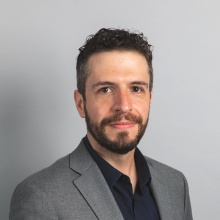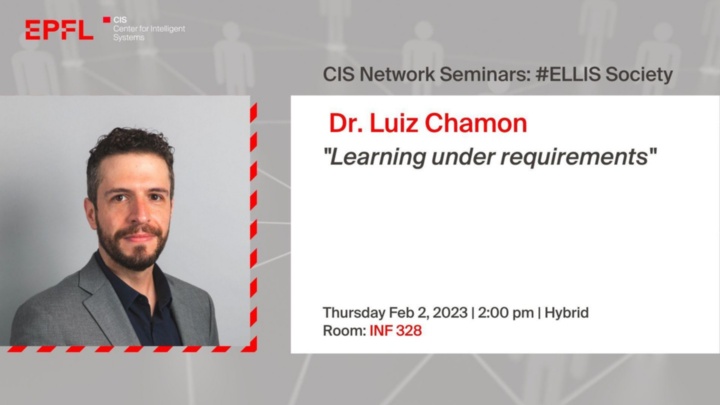Located in Switzerland, EPFL is one of Europe’s most vibrant and cosmopolitan science and technology institutions. The Center for Intelligent Systems at EPFL (CIS) is a collaboration among IC, ENAC, SB; SV and STI that brings together researchers working on different aspects of Intelligent Systems. Collaboration and networking are crucial in the advancement of research and are key pillars of the CIS’ activities. In the course of the “CIS Network Seminars”, ELLIS/SimTech Junior Research Group Leader Luiz Chamin will give a talk about “Learning under requirements”.
Learning under requirements
The transformative power of learning lies in automating the design of complex systems, allowing us to go from data to operation with little to no human intervention. Today, however, learning does not incorporate requirements organically, which has led to data-driven solutions prone to tampering, unsafe behavior, and biased, prejudiced actions. To realize its autonomous engineering potential, we must develop learning methods capable of satisfying statistical requirements beyond the training data. In this talk, I will show when and how it is possible to learn under requirements by developing the theoretical underpinnings of constrained learning. I will define constrained learning by extending the classical probably approximately correct (PAC) framework and show that despite appearances, constrained learning is not harder than unconstrained learning. In fact, they have essentially the same sample complexity. I will also derive a practical learning rule that under mild conditions can tackle constrained learning tasks by solving only unconstrained empirical risk minimization (ERM) problems, a duality that holds despite the lack of convexity. I will illustrate how these advances directly enable the data-driven design of trustworthy systems that adhere to fairness, resource, and safety specifications. I will also discuss new advances in semi-infinite constrained learning and show how hybrid sampling/optimization algorithms can be used to tackle challenging problems in robust learning. These contributions suggest how we can go beyond the current objective-centric learning paradigm towards a constraint-driven learning one.
Luiz F. O. Chamon
Luiz F. O. Chamon received the B.Sc. and M.Sc. degrees in electrical engineering from the University of São Paulo, São Paulo, Brazil, in 2011 and 2015 and the Ph.D. degree in electrical and systems engineering from the University of Pennsylvania (Penn), Philadelphia, in 2020. Until 2022, he was a postdoctoral fellow at the Simons Institute of the University of California, Berkeley. He is currently an independent research group leader at the University of Stuttgart, Germany, and a faculty member of the International Max Planck Research School for Intelligent Systems (IMPRS-IS). In 2009, he was an undergraduate exchange student of the Masters in Acoustics of the École Centrale de Lyon, Lyon, France, and worked as an Assistant Instructor and Consultant on nondestructive testing at INSACAST Formation Continue. From 2010 to 2014, he worked as a Signal Processing and Statistics Consultant on a research project with EMBRAER. He received both the best student paper and the best paper awards at IEEE ICASSP 2020 and was recognized by the IEEE Signal Processing Society for his distinguished work for the editorial board of the IEEE Transactions on Signal Processing in 2018. His research interests include optimization, signal processing, machine learning, statistics, and control.



